Community Tip - Learn all about the Community Ranking System, a fun gamification element of the PTC Community. X
- Subscribe to RSS Feed
- Mark Topic as New
- Mark Topic as Read
- Float this Topic for Current User
- Bookmark
- Subscribe
- Mute
- Printer Friendly Page
I want to find torque from standard power formula without changing equation to t=p*30/(pi.n)
- Mark as New
- Bookmark
- Subscribe
- Mute
- Subscribe to RSS Feed
- Permalink
- Notify Moderator
I want to find torque from standard power formula without changing equation to t=p*30/(pi.n)
I want to find torque from standard power forumla p=2piNT/60
i tried like
p=10kw
n=50 rpm
how to find T
Without making equation relating torque like
T=p*60/(2piN)
Solved! Go to Solution.
Accepted Solutions
- Mark as New
- Bookmark
- Subscribe
- Mute
- Subscribe to RSS Feed
- Permalink
- Notify Moderator
Maybe it should be that way:
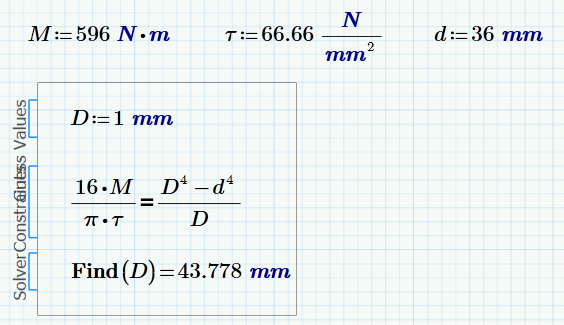
And next time please attach your sheet (additionally to your screenshots).
Werner
- Mark as New
- Bookmark
- Subscribe
- Mute
- Subscribe to RSS Feed
- Permalink
- Notify Moderator
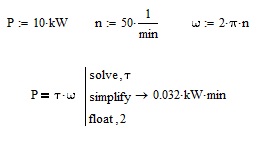
- Mark as New
- Bookmark
- Subscribe
- Mute
- Subscribe to RSS Feed
- Permalink
- Notify Moderator
i am new what is the operator or sign used F.M.
- Mark as New
- Bookmark
- Subscribe
- Mute
- Subscribe to RSS Feed
- Permalink
- Notify Moderator
See the following responses below
- Mark as New
- Bookmark
- Subscribe
- Mute
- Subscribe to RSS Feed
- Permalink
- Notify Moderator
If you need the calculation more often with different arguments, you might consider creating a function for torque
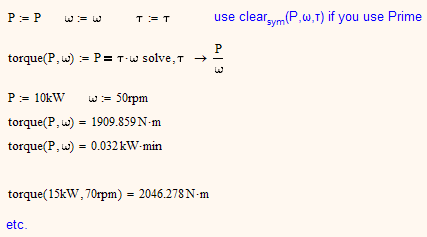
In case the formula is more complicated and cannot be solved symbolically anymore, you will have to resort to a numerical solve block:
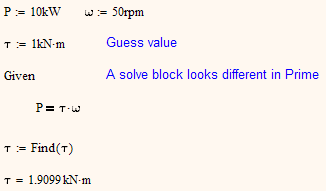
and of course you could turn this solve block in a function, too, if you like. You would simply write torque(P, omega):=Find(tau).
As you could see - when you define a variable with unit rpm, you already define omega = n* 2pi, not just n. And there is no need to manually convert minutes to seconds as Mathcad takes care of the correct units anyway.

After all, the suggested methods all seem overkill, as it would be to easy to simply do

but I guess you have more complicated formulas in mind which cannot solve for a variable that easy.
Werner
BTW, using the symbolical keyword "float" is dangerous and usually not recommended as it affects not only the display of the result but also the precision of the whole calculation. So you might lose significant precision!
- Mark as New
- Bookmark
- Subscribe
- Mute
- Subscribe to RSS Feed
- Permalink
- Notify Moderator
Also suppose i want to shuffle the variable required, i.e. standard formula is P=w*T.
1. Torque for Shaft 1 (T1)
2. Power transmitted using (T1).
- Mark as New
- Bookmark
- Subscribe
- Mute
- Subscribe to RSS Feed
- Permalink
- Notify Moderator
It is not working in Express Prime 3.1
- Mark as New
- Bookmark
- Subscribe
- Mute
- Subscribe to RSS Feed
- Permalink
- Notify Moderator
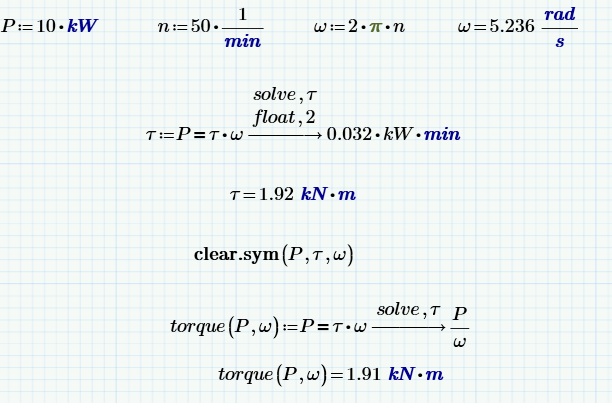
- Mark as New
- Bookmark
- Subscribe
- Mute
- Subscribe to RSS Feed
- Permalink
- Notify Moderator
"It is not working in Express Prime 3.1"
That is correct. The Express edition of Prime does not give access to symbolic functions (which you need to do formula manipulations) and other mathematical fun stuff like solve blocks. It's free, however.
Success!
Luc
- Mark as New
- Bookmark
- Subscribe
- Mute
- Subscribe to RSS Feed
- Permalink
- Notify Moderator
suyog patil wrote:
It is not working in Express Prime 3.1
P:=P etc. is for Mathcad 15 and below. I had written what to do in Prime and FM had shown.
clear.sym(P,tau,omega) makes the already assigned values of those variables "invisible" to the symbolics. Otherwise you would get a number result.
Until now you had not stated which version of Mathcad you are using. Now you write that its Prime Express.
Symbolics and solve blocks and a couple of other things are not available in Prime Express after the trial period. But your picture does not show any attempt to use symbolics. So probably you are still in your evaluation period and just are not aware of the many "equal signs" used in Mathcad and do not know how to type all this.
To write torque(P):=P=omega*tau solve, tau -> ...
you first use the ":" to get the assignment ":=". The next "=" is a thick, fat one. Its called the boolean equal sign and you cannot just type = on the keyboard (this would give you the normal evaluation equal). You have to get it from the menu or use the keyboard shortcut CTRL in combination with + (may differ for different language keyboards).
Then from the symbolics menu you chose "solve", add the "," and the solve variable "tau".
This should work (unless of course your trial period is already over).
Werner
- Mark as New
- Bookmark
- Subscribe
- Mute
- Subscribe to RSS Feed
- Permalink
- Notify Moderator
Attached is a sheet for you in Prime 3 format to give it a try.
If your trial isn't over, this is what you should see (if you trial period is over you will see the very same, too, but it will go away if you try to change values and/or recalculate the sheet):
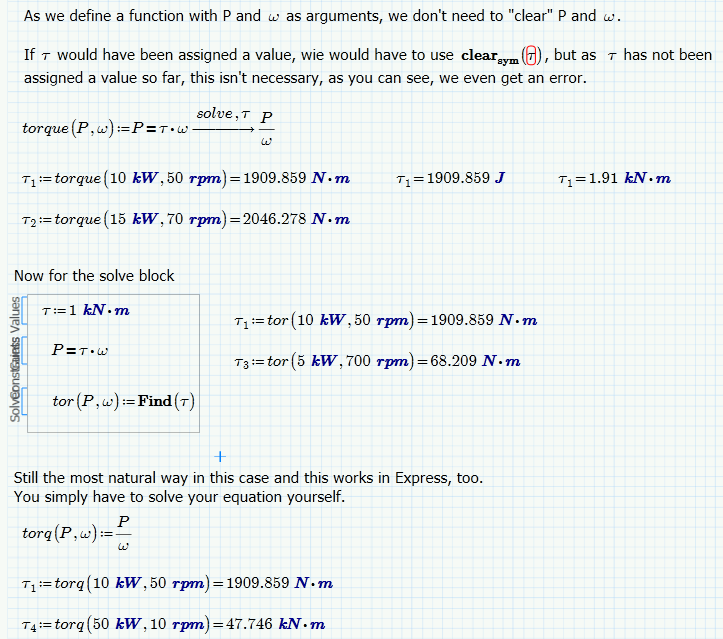
- Mark as New
- Bookmark
- Subscribe
- Mute
- Subscribe to RSS Feed
- Permalink
- Notify Moderator
suyog patil wrote:
It is not working in Express Prime 3.1
With Express the only way to solve your problem is
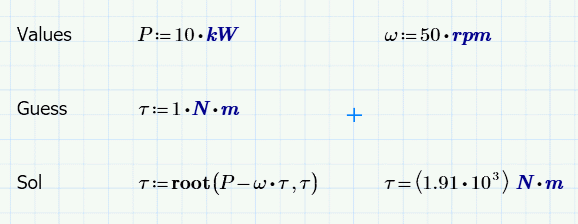
- Mark as New
- Bookmark
- Subscribe
- Mute
- Subscribe to RSS Feed
- Permalink
- Notify Moderator
I guess I don't understand the question and the use of solve blocks in some of the other replies.
Here's my Mathcad 15 statement of the problem. Or course you can change the output units to whatever you like
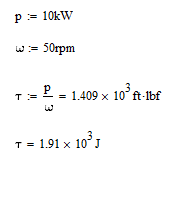
Here's the Mathcad Prime 3.1 view in with mks units.
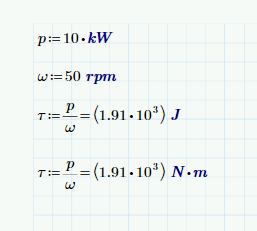
- Mark as New
- Bookmark
- Subscribe
- Mute
- Subscribe to RSS Feed
- Permalink
- Notify Moderator
I agree on and already had stated above that symbolics solve and the usage of a solve block are overkill in this case.
But the question was "how to find T Without making equation relating torque like T=p*60/(2piN)".
So manually solving this more than easy equation was obviously not the way to go. I assumed (and I am not that sure in the meantime) that the OP just used this equation as a simple example and had a much more complicated equation in mind, where manual solving would require much more effort or would not be possible at all. Thats the reason for the symbolics and solve block you see all over this thread.
Another reply of the OP which I did not fully understand led me to believe, that he wanted do the calculation with different input values. Therefore I suggested the creation of functions.
Werner
- Mark as New
- Bookmark
- Subscribe
- Mute
- Subscribe to RSS Feed
- Permalink
- Notify Moderator
Werner and Craig you both are correct to solve the simple way. Why cant we find any variable from standard formula without manipulating equation, as most of the errors are found in manipulating formulas. Consider following example.
Standard Formula is P=w*T
1- find T using inputs w and p (20rpm, 10kw)
2- find w using inputs p and T (25kw,10kNm)
3 - find P using inputs w and T (1000 rpm , 16kNm)
Now with same standard formula we have manipulate the equation 3 three times. Is this not time consuming.
Now this very simple formula, what for complex formulas. Is it not time consuming.
- Mark as New
- Bookmark
- Subscribe
- Mute
- Subscribe to RSS Feed
- Permalink
- Notify Moderator
> Why cant we find any variable from standard formula without manipulating equation,
You can! And it was shown in this thread how. But of course you have to tell Mathcad every time which equation to solve for which variable.
You can use:
1) symbolic solve
2) numeric solve block
3) root function
The first two are not available in the limited but free Express version of Prime.
- Mark as New
- Bookmark
- Subscribe
- Mute
- Subscribe to RSS Feed
- Permalink
- Notify Moderator
Straight up!
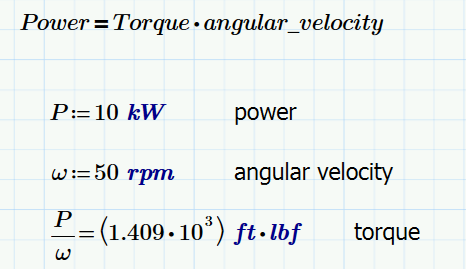
- Mark as New
- Bookmark
- Subscribe
- Mute
- Subscribe to RSS Feed
- Permalink
- Notify Moderator
Now can tell how to find the unknown variable Drr..it get complicated to go simplify...
or
- Mark as New
- Bookmark
- Subscribe
- Mute
- Subscribe to RSS Feed
- Permalink
- Notify Moderator
Your first example just returns the guess value because there is no constraint, just a function definition.
Your second example looks like it should work. We don't see what the error message is and can't play around with it as you didn't attach your sheet.
It looks like your formula for f is wrong, as your first summand is of dimension length^3 but the second is length^-3 !!
- Mark as New
- Bookmark
- Subscribe
- Mute
- Subscribe to RSS Feed
- Permalink
- Notify Moderator
Maybe it should be that way:

And next time please attach your sheet (additionally to your screenshots).
Werner
- Mark as New
- Bookmark
- Subscribe
- Mute
- Subscribe to RSS Feed
- Permalink
- Notify Moderator
Or






